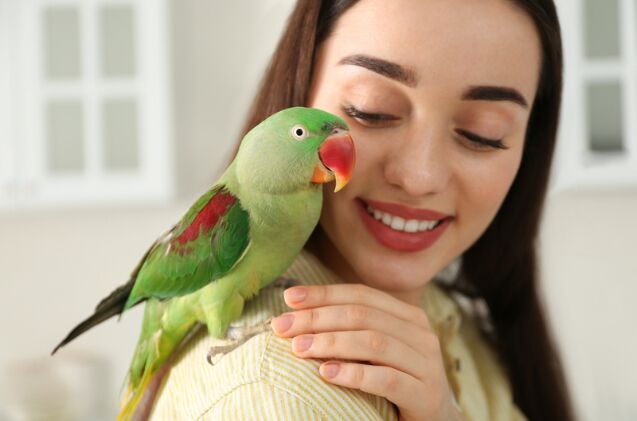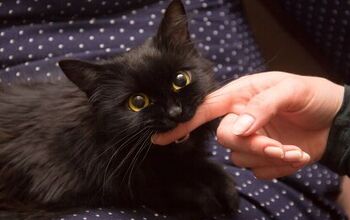Why Is My Bird Biting Me?

If you’re a bird parent, you love and cherish your feathered friend – but what do you do when your bird nips or bites? This is a behavior that can be both surprising and concerning, especially for first-time bird parents. But know, you’re not alone!
If you’re wondering, “Why is my bird biting me?” This article is for you!
We will explore the different factors and explanations for your pet bird’s newly developed biting tendencies, helping you understand the motivations, identify when there is a deeper problem requiring your attention, and learn how to address the behavior appropriately.
Let’s look at how to set you and your bird up for a long, happy relationship by addressing problem biting today.
Do Bird Bites Hurt?
The short answer to this is – Maybe? Whether or not your bird’s bite will hurt depends on a few factors, including how the bird bites, their overall intention, your bird’s size, and your level of pain tolerance.
Bird bites can range from a light little nibble that merely tickles to bites that have the capability of causing serious damage, especially to vulnerable areas like the eyes, ears, nose, lips, fingers, and toes.
The potential for a bird bite to cause severe or lasting injuries highlights the importance of understanding your bird, why they may bite, and how to prevent this situation from happening. It’s also one of the most important reasons to consider when deciding if a bird is right for your child, elderly, or special needs family member.
Even smaller birds can cause a surprising amount of pain. Often, it’s not the initial bite that causes the most pain. Instead, it’s the way that they will dig in or even grind their beaks that will lead to discomfort, stinging, and soreness.
Reasons A Bird May Bite You
Now that we have determined that a bird bite can cause anything from mild discomfort to severe and lasting injuries, it’s time to dig into these occurrences a little further. The only way to stop biting is to understand why your bird engages in this behavior. This will allow you to address the root cause.
Climbing
Was your bird trying to climb and explore at the time of the bite? If so, this may not be an intentional attack on you at all. Birds use their beaks much like a third hand, grabbing onto surfaces to help them climb or to help them stabilize themselves. If that surface happened to be your finger or even your nose, the intent may not have been to cause any harm. Rather than biting, this is referred to as “beaking.”
Exploring Their World
Here is an example of another innocent use of beaking. Birds often rely on their tongues to feel out and explore their surroundings. If they are being introduced to something new or different, like a new texture in your clothing or a new ring on your finger, they may appear to be biting while just trying to collect more information.
Pay attention to whether the beak closes during the “bite” or is simply placed around your finger or other item/body part to give their tongue access to the surface.
Fear
One of the most common reasons for a legitimate bite is fear or anxiety. If your bird is put into a situation where it feels trapped or frightened, a natural response is to bite in an effort to defend themselves.
Some situations that could make a bird fearful include backing your bird into a corner or area where they feel trapped, handling them roughly or aggressively, raising your voice around your bird, or putting them into a situation where the environment triggers fear due to loud noises or too much activity.
Learn to recognize the warning signs that a bird is becoming stressed or anxious. If you know your bird is triggered or fearful, immediately move them into a safe and comforting environment. This often means placing them back safely inside their cage and, in many cases, covering the cage for added security.
Aggression/Anger
Just like any animal, each bird has its own unique personality. Some birds will respond to situations more aggressively than others. If your bird is upset or angry, regardless of the reason, they may lash out – especially if they are being forced into a situation where they are being handled when they want to be left alone. Some birds will become more emotional and experience anger or frustration more frequently as they age.
Bites out of anger can easily be avoided by learning to read your bird’s body language and giving them space when it’s clear they want to be left alone.
Pain or Discomfort
If your bird is sick or injured, they may be overly sensitive. This includes not necessarily wanting to be touched and being overly defensive over threats that may not have otherwise made them fearful.
Pay careful attention to your bird’s behavior for signs that they may be acting “off” or different than usual. You can also watch for signs of trouble relating to their food and water consumption or through their waste when cleaning their cage. If you notice any red flags, contact your veterinarian to discuss your concerns and rule out any medical causes.
How Can I Tell if My Bird is Scared or Stressed?
As mentioned, the best way to prevent bites out of fear is by recognizing when your bird is anxious or afraid and taking steps to make them feel more comfortable. Of course, our feathered friends aren’t going to tap us on the shoulder and kindly inform us that they are scared. Instead, we must learn how to read their body language and what warning signs we should look out for.
In addition to biting/aggression, the most common signs of stress or anxiety in a bird include:
- Excessive vocalizing
- Hissing
- Freezing up or suddenly getting quiet
- Feather picking/self-mutilation
- Abnormal repetitive behaviors (pacing, head swinging, foot tapping)
- Panting
However, it’s important to note that each bird species and each individual bird may respond differently. The closer your bond with your bird and the better you get to know them, the more likely you are to notice that something is “off.” Trust your gut. If you notice your bird’s behavior is abnormal or suddenly changes, it is better to err on the side of caution.
Many of these signs of stress and anxiety are also warning signs of a medical problem. If you ensure your bird is calm and stress-free and the symptoms continue, contact your veterinarian.
How Can I Tell if My Bird is Mad at Me?
Another critical emotion to be aware of in your bird is anger (or frustration). These are big feelings and ignoring them can have significant consequences. They don’t necessarily have to be angry with you to lash out unexpectedly!
An angry bird may show any of these signs:
- Pacing
- Flying erratically around their cage
- Bobbing their head
- Shaking their feathers
- Loud vocalizing
- Attacking or beaking items in their cage
If you notice any of these signs, it is safe to assume that your bird is not interested in being held or handled right now. Just as we deserve to have our boundaries respected by other people, we should also acknowledge our birds' boundaries. When they appear angry or upset, give them space and try to interact again later.
How Should I React When My Bird Bites Me?
Even if you take all possible precautions, you must remember that accidents happen. There is still a chance that you may be bit at some point.
The first thing to remember is that most bites result from big emotions – be those emotions fear-based or out of anger. If you get overly worked out or snap at your bird vocally, you are simply escalating the situation. Instead, speak in a low, calm voice and move in slower yet confident movements.
Immediately following a bite, a “time out” is necessary. Place your bird back in their cage and either leave the room entirely or avoid eye contact. This is a good time to take a few deep breaths as you and your bird are calming down.
Return to your bird after approximately 5-10 minutes and show them positive attention. This could include talking to them in a positive, upbeat tone, offering a treat, or petting them if they are a fan of that type of physical affection.
Take some time following any incident to reflect on the situation. Ask yourself whether a trigger or a threat could have been avoided. This will allow you to approach similar situations in the future with a better idea of how to make it safe, comfortable, and enjoyable for all involved.
Of course, if the bite did break the skin, you should address the injury accordingly. Clean and disinfect the wound to prevent infection. If the wound is deep or bleeding significantly, seek medical care.
How Do You Stop a Bird from Biting You (or Others)?
The best approach as a bird parent is to prevent these situations from ever happening. Luckily, there are many ways you can set your bird up for success. Here are a few changes you can incorporate into your daily routine to create a safe, happy, and loving home for your bird:
Prevent Cage Boredom
One cause of frustration in birds is feeling bored when spending time in their cage. This can become pent up over time, leading to them eventually acting out and engaging in unwanted behaviors, including aggression.
To prevent boredom, consider ways to offer entertainment and mental enrichment. Ensure their habitat is large enough to allow them to roam and be active. Add bird-friendly chew toys and other engaging forms of entertainment, such as foraging toys and things they can climb on.
Of course, the best way to prevent boredom is to give them plenty of time outside the cage, engaging with you (or others in the family) when possible.
Regular Veterinary Visits
Have you found a local avian vet you can trust? If not, this is your sign to start looking! One of the best things we can do for any pet is to create an ongoing working relationship with a vet. This includes annual checkups. Your vet may be able to identify signs that something is wrong long before the symptoms are apparent, allowing you to address the problems early and prevent further pain or discomfort.
Advice Guests in Advance
If you have guests visiting, ensure they know that your bird is present and how to approach your home environment best. Explain that loud or overly excited behavior, especially from a stranger, could be startling and recommend they try to stay calm when in your bird’s presence.
For guests interested in engaging with your bird, explain beaking and the usual bird behaviors. Warn that they may use their beak to climb or explore this person, their clothes, or other aspects of their surroundings. This will set both your bird and your guest up for success in their interactions.
Always Supervise Children
Do you have children in your home? Are there kids coming to visit? Never leave a child in the room with your bird without supervision. It only takes a second for a curious child to stick their finger into the cage and be bit. Children are loud, excitable, and unpredictable, which can be a lot for a bird.
If you have a child who is interested in handling your bird, make sure that you carefully explain all expectations and never leave their side. Be realistic regarding a child’s age and whether they can handle your bird safely on their own. For curious younger children, it may be better to have you hold the bird and teach them to pet it safely, allowing you to manage the interaction better.
Track Bites for Better Understanding
In the event that your bird does bite, write down any key details about the situation. What was happening when they bit? Were there any triggers that could have scared them or triggered them? Was their food or treats involved? Were they being handled? If so, who by?
Keep all of this information together in a notebook. By comparing the details from each incident, you may be able to spot patterns or triggers you weren’t previously aware of that can help you prevent future problems.
Final Thoughts – Why is My Bird Biting Me?
The secret to effectively preventing a bird bite is understanding the emotions and boundaries of your feathered friend. Often, they will try to communicate through body language that they are uncomfortable long before they feel it is necessary to lash out defensively or aggressively. It is our responsibility to learn and be on the lookout for these warning signs.
Learn how to read a bird’s body language. If you notice something is “off,” look into it and address the problem. This often means contacting your veterinarian to rule out a potential medical cause.
Create a calm, safe space for your bird whenever possible. Not only does this mean setting up a cage with everything they need to feel secure, but also paying attention to the environment. Always supervise children around your bird and warn guests about getting too animated or excited if that stresses them out.
Your feathered friend can’t speak up and make demands (at least, not all birds and not necessarily in English) – it’s your job to advocate for them!
Join the PetGuide community. Get the latest pet news and product recommendations by subscribing to our newsletter here.

Britt Kascjak is a proud pet mom, sharing her heart (and her home) with her “pack” which includes her husband John, their 2 dogs – Lucifer and Willow – and their 2 cats – Pippen and Jinx. She has been active in the animal rescue community for over 15 years, volunteering, fostering and advocating for organizations across Canada and the US. In her free time, she enjoys traveling around the country camping, hiking, and canoeing with her pets.
More by Britt
























